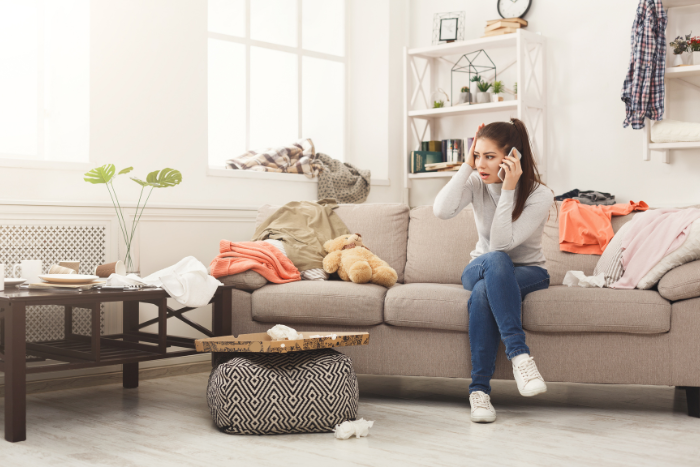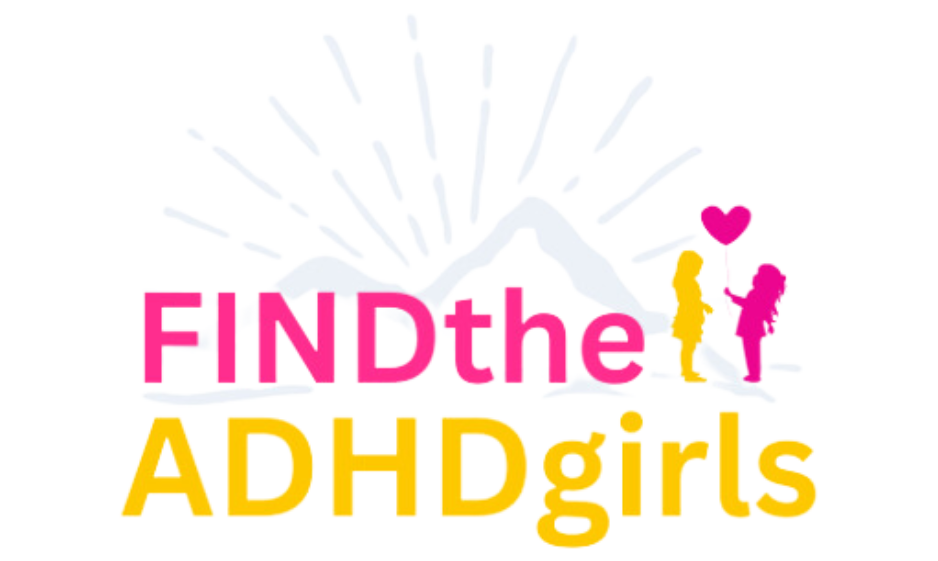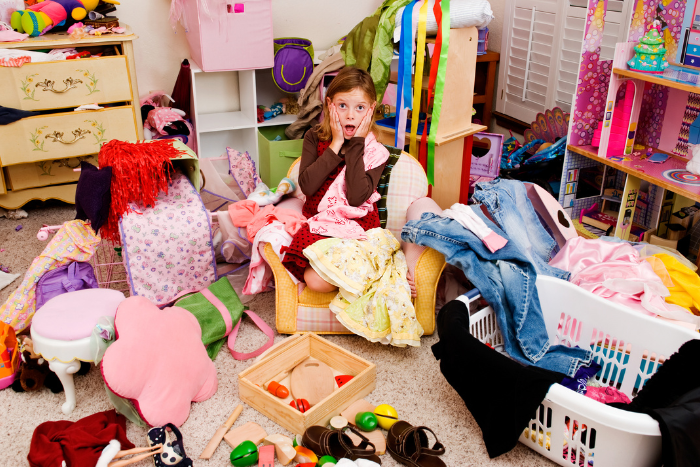“I like messy people; people who don’t fit in a box or stay between the lines, but whose integrity is greater than any rule book and whose loyalty is stronger than blood.”
— Jim Wern
As a person with ADHD, immaculate would not be the first word friends and family use to describe me.
For as long as I can remember, I’ve felt comfortable in surroundings closer to the more disheveled and imperfect end of the spectrum (as opposed to pristine).
During wood-shop class back in 6th grade, wood chips dusted the grounds of the classroom, the way peanut shells litter the floors of Texas Roadhouse. Planks clattered against the table while pre-teen girls chatted amongst themselves as they sanded. Boys yelled, speaking less but always louder when they did, loud enough to compete with the sounds of the sanding machines and woodcutters.
Half the girls made reindeer boxes. The box was the reindeer’s torso, which we filled with chocolate kisses wrapped in snowflake foil.
The one I made didn’t stand up straight. Its legs were uneven, it looked like it was permanently limping.
Another way ADHD presented itself was through messy handwriting. My fourth-grade teacher wrote the following on my report card: “the content of your ideas is exceptional, however, you need to work on your penmanship, because unfortunately, this is something we get judged for out in the world.” I once joked to a queer friend in college (back when I conflated gender with sexuality), that I had “lesbian handwriting” — implying that sloppy penmanship was one of my masculine traits.
Traits of it also showed themselves in hyperactivity and bouncing from one subject to another. In a video I recently uncovered, filmed just before Thanksgiving 2002, my speech was all over the place. I lily-padded from the meal my mom was preparing to shots of my cat Waldo to how the Pilgrims brought over squash and other crops during their original journey to The New World.
In addition, I was constantly losing things. Whenever my mom cleaned out my backpack, she learned to not bat an eyelash upon finding a pencil, a sock, and bell pepper all within the same pouch. In a 2006 journal entry, I wrote, “It’s annoying that all my journal entries from the past couple of years are scattered throughout random notebooks. I want to look back on my teenage years and have all the memories kept in one place. Instead, they’re under the bed, at the bottom of my desk drawer, stuffed in folders, saved onto the computer. My mind would just be so much clearer if they were in one place.”
At school I didn’t display the behavioral symptoms of hyperactivity, which were characteristic of most people’s conceptions of ADHD at the time (and still are now to some extent). My seeming placidness and obedience — in fact, I was often one of the quietest kids in class — kept many of my teachers from thinking I had it.

Granted, I don’t live in squalor. The truth just is that a few crumbs on a counter genuinely don’t bother me. In fact, they even put me at ease.
I know not everyone shares this preference though. And when it comes to coexisting with others, the discrepancy can cause considerable friction.
Tralee Pierce wrote that in a study conducted by Eric Abrahamson and David H. Freedman for their book A Perfect Mess: The Hidden Benefits of Disorder, “They found that 80 percent of people who were living with someone said the differences over mess and disorganization were a source of tension, and one in 12 people cited strife over mess as a factor in their separation, breakup or divorce.”
Years ago I moved in with housemates aware of the degree of compromise and sacrifice that communal living requires. Knowing that other people’s standards differ substantially from mine, I adjusted my habits.
I ensured I picked up after myself when in common spaces and contained any tangible evidence of my natural tendencies in my room. I worked against those tendencies to be more of a team player.
Despite these efforts though, they would occasionally still slip out. And when they did, it led to discord.
As a person with ADHD, it’s often not easy to bring the condition up. It’s often not thought of as a legitimate one (especially if you don’t conform to people’s stereotypes of what an ADHD person looks and behaves like) or is easily dismissed by others as mere laziness.
I worry, in broaching the subject with housemates, that it will sound like an excuse or cop-out. Many think of it this way, rather than as a window into the way another person’s mind works (and their behaviors as a result of it).
It’s frustrating when clean and orderly treat their way as the gold standard — viewing themselves as more mature, put together, and responsible. A lot of people would snicker at hearing “this is ableist” — but to me, it is.
Read many housing ads and you’ll see people’s preferred roommates as ones who are clean, pick up after themselves right away, and maintain the common areas.
Those who don’t share this need, or who even prefer a little bit of clutter, are both implicitly and explicitly encouraged to conform to the “better” or “right” way — or the seemingly universally agreed-upon standard. Generalizations are made about us; messy people are inconsiderate, irresponsible, and less mature. We are lazy or don’t have our lives together.
Less often do I hear the message: they have different priorities; or the environmental organization just doesn’t concern them as much — nothing more or less than that.
Our critics’ ability to extrapolate — deriving all those traits from a single habit alone, or a differing preference — while deifying themselves and their own preferences, feels as unfair as it does ableists. I think it should go without saying that cleanliness alone shouldn’t be the sole metric off which to measure the above-mentioned traits.
A blogger I follow validates this, writing about how “a spotless interior can be unnerving. Sliding into a sterilized, perfumed chamber without so much as a gum wrapper in sight, you may be afraid even to exhale lest you pollute the environment. You might feel more comfortable if you spotted a Big Gulp container in the backseat.”

According to Abrahamson and Freedman, one of the six key benefits of messiness is flexibility. “With messy systems, change can occur more easily in a wider variety of ways than the more rigid neat systems,” they write.
Messier people also tend to be very accepting of others. The folks I tend to feel most comfortable around are ones tolerant of imperfections; they may or may not have pristine rooms, but they don’t prioritize cleanliness above all else, nor does an errant crumb on the table lead them to make vast cognitive leaps and character generalizations. They instead focus on no more than what’s in front of them: a crumb is just a crumb.
Sometimes we’re not onto someone’s case about a dish left out because we know they had a stressful day, or are struggling mental health-wise — and we, therefore, make a conscious decision to let their well-being, at that moment, take priority over having total control over our surroundings. Life is inherently messy, and I sometimes wonder if people who are overly fixated on everything being one hundred percent in place are in partial denial of this truth.
I also believe that self-growth occurs in messiness and that she who is willing to sit in a messy room is also willing to sit (and therefore eventually accept and work with) a messy mind. When a little bit of clutter surrounds me, I feel more in touch with my own internal messiness and unfinished business — therefore better equipped to begin tackling it.
Abrahamson and Freedman describe invention as another benefit to messiness: “Mess allows system elements to more randomly move about, leading to new solutions. Neatness can limit novel and unexpected elements to be present. Chefs often prefer to work in the midst of a spread of ingredients and tools in order to come up with new food combinations and techniques.”
Kim Fusaro writes that, “Mark Twain and Steve Jobs also dabbled in genius from behind messy desks. Agatha Christie was notoriously disorganized. And maybe you’d think more of the office hoarder if you knew what Mark Zuckerberg’s workspace looks like.”
Room clutter can also be an important visual cue that something needs attending to on the inside. The planet alerts us to its state of health by providing visual and tactile cues. So too can our bodies and direct environments provide valuable insight into our inner states. You’re feeling tired. You’re feeling like your freedom is under threat.
I can then attend to my inner state before tackling the exterior — whereas if I simply tidied my room without doing that inner work, I’d eliminate these signals that point me to the need for it.
RESONANCE is the way that Abrahamson and Freedman refer to this benefit of messiness: “Mess contributes to having a system harmonize with its environment, receiving helpful information. Neatness can insulate a system from environmental cues.”
People’s need for orderly surroundings is valid. For some, it legitimately eases their anxiety. In the show Good Trouble, the character Evan explains to Mariana that his belongings are the one element of his life that he feels he can control — which makes the order in his surroundings really important for him to have.
Taking this into account makes it easier to empathize. I find myself naturally wanting to organize and clean out of a genuine desire to help the person feel more at peace and support.
I can also recognize that I’m able to locate things more easily when my environment is generally cleaner. I do feel slightly less mental chaos when belongings aren’t totally strewn about. As Victoria Fedden wrote in Elephant Journal, “A clean, uncluttered living space is healthy and calming. Organizing and getting rid of things that no longer serve us make room for new energies, opportunities, and even new people to arrive in our lives.”
Still, our way is valid too. Little consideration seems to be given as to why we might prefer our environments to be the slightest bit unkempt — for instance, that maybe in a place with signs of imperfection, we feel like we can breathe more easily. Maybe we smile at seeing an errant pen across the table, or an opened notebook against the couch — because we know it means someone was creating something there a few hours ago. One person’s mess is a sign of life to another.
For any other person this resonates with, know that you’re not alone. Send me a roommate application; I won’t be on your case if you leave a dish or two to soak until tomorrow. In fact, it will put me at ease.
About the Author

Eleni Stephanides
A queer writer and Spanish interpreter with ADHD, working as a Senior Coach at The ADHD Advocate and advocating for mental health through her "Queer Girl Q&A" column for Out Front Magazine.
Share via:

